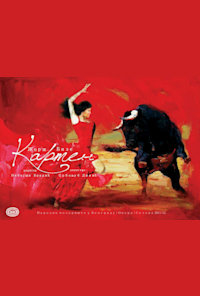Georges Bizet's Carmen opera is one of the strongest artistic expressions of the triumph of passion over sentimental love. In relation to Merimee's story, the opera represents a powerful poetic superstructure as the fruit of meaningful structural shifts. Bizet's Don Jose is a man who derives his destiny from the inertia of everyday life and pale emotional obligations, and draws it into the depths of something he does not know - the world of passions outside the law. They often portray Don Jose as an unsound soldier who neglects his duties in order to follow a dangerous seductress. However, Don Jose begins to live only when he meets Carmen, love happens as a second birth, transforming an almost ectoplasmic personality into a full-blooded man. Observations that he shows weaknesses by not following Carmen cannot be accepted, because he does so, but not in a straight line, blindly to the end. He returns to his dying mother, instead of responding to the life challenge that Carmen offers him: he is not a free man and that is why he is losing her. It was necessary to introduce the character of Mikaela to the opera. It represents Christianity, family ties, legality and sentimental love. All this was destroyed by a burst of passion. Mikaela shares a musical vocabulary of gentle and intense lyricism with Don Jose, which is the complete antithesis of Carmen's songs and games. Throughout the opera, Bizet masterfully uses this contrast. In the duet in Act I, Don Jose and Mikaela easily find the musical language with which they evoke memories of his beloved mother. Opposite this duet is the duet of Don Jose and Carmen, which is set in a completely different way. The dramatic opposition between Don Jose's lyrical register in the aria "La fleur que tu m'avais jetee" and the rhythm of the tarantula that Carmen sings in "La bas dans la montagne" does not allow them to achieve a balanced duet. It was done with intention, simple musical means that indicate that people do not speak the same language, nor do they share the same values. The character of Escamillo is the next significant "addition" of the opera to the story of Prosper Merimee. Escamillo is the embodiment of masculinity, Bizet achieved this with a conflicting duet in Act III. Opposing the celebrated bullfighter, Don Jose wants to confirm his passion and skill as a fighter. Although Carmen leaves Don Jose for Escamillo, that doesn’t mean their love should be compared. Escamillo is ready to wait his turn among those chosen by Carmen, without showing too much impatience. When Escamillo addresses Carmen in a short duet in Act IV, it is solely that, faced with a possible death, he would promise to say her name the next time he kills a bull. Escamillo resolutely defies fate, risking his life in every fight, and that challenge is his greatest passion. Carmen's enduring fascination and mystery lies in the fact that no psychological guidance has been offered for the deep motives of her actions, nor a hierarchy of her motives. Carmen never explains herself: she only emphasizes her will to stay free. Does she love Don Jose? Carmen never says that. Anyway, she chooses him, throwing him a flower in the first act. Why? Probably because he is different from other men: he doesn't even look at her. Fate made its entry, sudden and unusual. Carmen is several times disappointed with Don Jose's indecision and therefore provokes him. But, she is deeply interested in a man for whom love is not a game, who is mortally attached to it. At the end of the opera, Carmen causes death, despite all the warnings that she will meet Don Jose. The mere fact that she misses the ceremony at which she was supposed to triumph, in order to face Don Jose, speaks volumes about Carmen. Such provocative behavior is not a disguised suicide, nor an idealistic attempt to sublimate his love, but something that is absurd in its rationality, something that Carmen simply has to do in order to remain her own. Carmen's death is radically the opposite of Isolde's death, whose brilliant joy in death comes from her mystical beliefs in the transcendence of her eternal love. Isolde and Tristan are passive victims of eros, while Carmen and Don Jose are fully active in their love and death. After he killed her, and not Escamilla - which would seem more rational at first glance - Don Jose fulfills the need to own her. Bravely opposing him, Carmen expresses her will and firmly affirms the autonomy of her personality. She boldly chooses to fulfill her destiny. This is exactly what Nietzsche considered essentially tragic: facing death - not with the goal of denying life, but agreeing to it.






